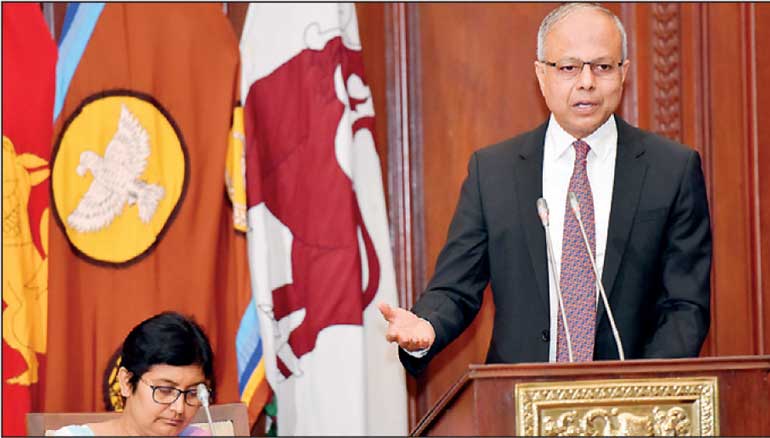Thursday Feb 26, 2026
Thursday Feb 26, 2026
Wednesday, 24 January 2024 00:20 - - {{hitsCtrl.values.hits}}

National Security Senior Adviser and Chief of Staff Sagala Ratnayake yesterday declared President Ranil Wickremesinghe’s effective economic initiatives have fostered trust in the Sri Lankan economy on the global stage.
He highlighted the President’s commitment to a new economic vision aimed at stabilising the country’s economy through comprehensive reforms in the financial, legal and governance sectors.
Speaking at the ‘Budget 2024’ conference, organised by the President’s trade union relations division, Ratnayaka outlined the plans to position Sri Lanka as a hub for energy exports. This strategic move aligns with the President’s broader efforts to enhance the nation’s economic standing and international reputation.
In his speech Ratnayaka also said the following.
When President Ranil Wickremesinghe assumed office, the country faced a severe economic crisis marked by long queues for oil and gas, as well as prolonged power cuts. The crisis was exacerbated by a tax policy that led to a decline in Government revenue, an ineffective agricultural policy, and a decrease in tax filings. Additionally, the economic downturn was heightened by a drop in tourist arrivals due to the Covid-19 epidemic, resulting in a loss of foreign exchange.
In response to these challenges, the current President took charge amidst this economic turmoil. Strategic changes were made to the agricultural policy, leading to increased rice production and alleviating food shortages. Collaborating with the International Monetary Fund, a new program was devised to stabilise Sri Lanka’s economy, encompassing crucial financial, legal, and governance reforms. Despite the imposition of new taxes, which brought some pressure on the citizens, the Government’s efforts have led to a rapid stabilisation of the country’s economy. As a result, international confidence in Sri Lanka has grown, and the nation is witnessing a strengthening economic trajectory.
Furthermore, there are new proposals for reform aimed at boosting the tourism industry, contributing to a surplus in the balance of payments under this economic program. Notably, foreign reserves, which stood at $ 2.1 billion in 2022, has seen a significant increase to $ 4.5 billion today. The Government has successfully curtailed inflation from 77% in 2022 to a commendable 4% at present. Achieving a state revenue of around 16% of the Gross Domestic Product (GDP) is essential for effective governance. Despite the challenges, the economic reforms implemented in 2023 resulted in a state income of approximately 11% of the GDP.
The key to economic stability lies in strengthening Government revenue, and plans have been set in motion to systematically increase revenue through institutions like the Inland Revenue Department, Sri Lanka Customs, and the Excise Department. Relief for the entire populace can be anticipated within the next year if this economic program is effectively executed. The 2024 budget outlines development proposals, including the provision of free land for farmers and housing rights for urban residents, with substantial allocations for relief.
Additionally, proposals for the modernisation of the agriculture and fishing industries have been submitted. Moreover, Sri Lanka holds the potential to generate 80 gigawatts of renewable energy, far exceeding the estimated 15 gigawatts required for total electricity consumption by 2050. Plans are underway to position Sri Lanka as a centre for energy export, including the production of green hydrogen to boost the national economy. Despite challenges, the nation possesses the capability to emerge as an economic force in the international arena.